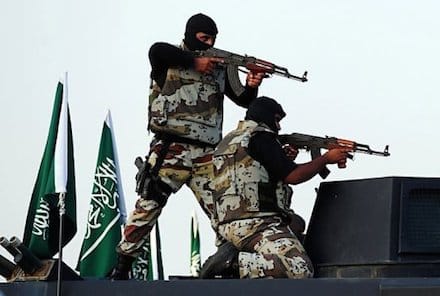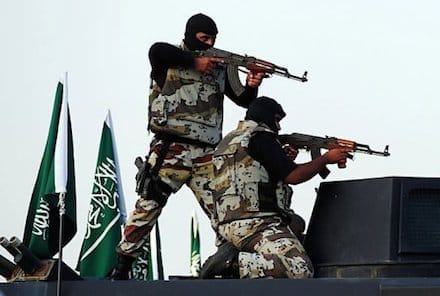
Anyone reading the New York Times report of a minor skirmish on the Saudi-Iraqi border on 5th January, 2015, would probably have shrugged and moved on. What with ISIS controlling roughly one third of Iraq and Syria and Shiite Houthi rebels overrunning about 70% of Yemen, Middle East watchers surely had more pressing violence to concern them than “a confrontation that left three guards and all the assailants dead”? [1] But then reports leaked out of the Kingdom that put the border clash in a very different light.[2]
Contrary to the New York Times which relied on the official spokesman of the Saudi Interior Ministry, not only had two of the assailants escaped, their Saudi victims included the general commanding the country’s northern zone. Brigadier-General Oud Alad al Balawi was not normally posted at the border crossing nor would chance infiltrators have had reason to expect to find such a senior officer there. Why were armed men with suicide vests able to get close to the Saudi general?
There are uncomfortable echoes of the murder by jihadi extremists of the US ambassador to Libya in Benghazi in September, 2012. Just as Chris Stevens was plausibly reported by Turkish sources to have been in contact with Libyan jihadis arranging their transit via Turkey to fight Assad’s regime in Syria, so the northern zone of Saudi Arabia has been a major transit point for Saudi radicals and other volunteers from the Gulf states and Yemen entering both Iraq to fight the Shiite-dominated government there as well as to go to fight the Iranian-allied regime in Syria.
Ambassador Stevens’ last recorded meeting was with the Turkish consul in Benghazi to arrange visas for Libyan anti-Assad fighters. Some of these jihadis then appeared at the US compound in an angry mood – had they been cut out of the deal? – and murdered the US diplomat and three other Americans while the 30 or so CIA staff elsewhere in the compound hunkered down. The jihadis who killed General Al Balawi seem to have been admitted through the normal security surrounding a senior Saudi officer – rather as their Libyan counterparts were admitted to the US compound in Benghazi before opening fire with their weapons. Was Al Balawi in contact with them? It certainly seems they were trusted by his subordinates to get up close and deadly.
Saudi apologists have gone into overdrive since the Kingdom admitted the murder of such a senior security officer. Al Balawi’s murder disproves, they say, the allegations that Riyadh had stoked the ISIS uprising in Iraq and Syria. Maybe, but the suspicion must be that the ailing King Abdullah and his royal nephews and cousins running Saudi Arabia must be looking up the Arabic for “blowback”!
Remember Saudi Arabia wasn’t happy about George W. Bush’s invasion of Iraq. It wasn’t doubts about the existence of WMD in Saddam Hussein’s state which kept the Saudis awake at night. They did not believe that fairy tale. But what concerned them was that President Bush would keep his word and bring democracy to Iraq!
The Islamic Republic of Iran was one Shiite democracy too many already for Riyadh. But granting elections to a majority Shiite and Arabic-speaking country like Iraq was a mortal threat to the Kingdom, which is a family tyranny with a significant but never officially-counted Shiite minority. Undermining Iraqi democracy once a Shiite parliament was elected was a key goal of Saudi Arabia’ dynasty. It fitted in with their desire to undermine non-Sunni Muslim regimes in Iran and Syria.
Funding foreign fighters to go to both Iraq and Syria to fight jihad for the Saudi’s own strict Wahabbite version of Islam made sense to Riyadh – as had funding Osaama bin Ladin to go to Afghanistan all those years ago.
But just as Osaama got too big for his boots, so the self-proclaimed ISIS caliph al-Baghdadi became convinced that his time had dawned. It wasn’t enough for him to pray in Mosul’s oldest mosque, he must come to Mecca itself to pray at the Kabba and be accepted as the Prophet’s caliph. For the Protector of the Holy Places in Riyadh – or whichever luxury hospital is treating the ninety-year old Abdullah – this ambition was too much. Saudi money and connivance with ISIS was supposed to promote regime-change in Baghdad and Damascus not back home in Riyadh.
The Saudi regime has been building bridges to the despised Shiite elected politicians in Baghdad, even announcing the opening an embassy in Iraq for the first time in twenty-five years. Reaching out to the “heretics” in Baghdad brought blowback as the ISIS murder squad came to meet the Saudi general for early morning tea and blew him to pieces.
From Afghanistan now to its northern border, Saudi sponsorship of ultra-radical Sunni fundamentalists has repeatedly brought deadly violence. Think only of the Al Qaeda bombing of the US base at Daran or the attack on the USS Cole in Aden harbour (both blamed by Senator McCain on Iran in case you doubt the evidence trail leads to Saudi-sponsored and US-colluded radicals) to get a hint of what might now threaten the Saudi dynasty itself. If the jihadis knew how to find General Al Balawi and to kill him, they could know a lot about the movements and agendas of other key Saudi security officers.
As Ibn Saud’s last son, Abdullah, seems to wheeze towards the end of his days, will the Saudi dynasty be secure enough to outlast him and face down the the sorcerer’s apprentice which it fostered in ISIS?
[1] http://www.nytimes.com/2015/01/06/world/middleeast/saudis-report-deadly-border-clash-with-infiltrators-from-iraq.html?_r=0 [this report was issued on 5th January, 2015, but dated for print edition as 6th January.]
[2] See the AP report (5th Jan. 2015): http://www.thenational.ae/world/middle-east/suicide-attack-kills-senior-saudi-officer
Reprinted with author’s permission from CRIOXBlog.


